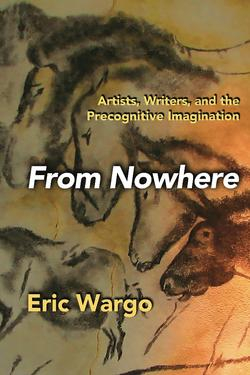
Reviewed by Fred Andersson
For as long as I remember, I have felt that dreams are another kind of reality, a “real” reality, a chaotic version of my own. Maybe the essence of my life, a witch's brew of experiences and events. A way for my consciousness to process it all until a breaking point is reached with either absurdity or, sometimes, pure terror. It is as if my life goes on, upside down, when I enter the dream state, and turns back to normality when I wake up. Sometimes I half-jokingly say that there is nothing more boring than hearing people tell you their dreams, mostly because I feel that they are something highly personal and rarely makes sense to someone else. That said, I am going to start by doing just that.
I have had (at least) three precognitive dreams in life, and I will tell you all of them, so if you find that boring, please stop reading—but then you will miss the main part about Eric Wargo’s new book, From Nowhere. One morning I woke up with nonsense in my mind. In my dream, I had seen a car standing in a parking lot, and the vehicle was covered with green grass. As usual, like the mindless creature I am, I picked up my phone for the traditional doom scrolling and saw a message from my friend Shahruk, a Pakistani DJ living in Stockholm. For some reason, I no longer remember why, he had sent me a photo of a van covered with green, plastic grass. Another time, after reading Allen Greenfield’s The Secret Cipher of the UFOnauts, I had confusing dreams involving Greenfield himself. The next morning, I opened my cell phone and saw that he, Greenfield, had sent me a contact request on LinkedIn. The third dream? I will save it until the end of this text.
When Eric Wargo’s Time Loops (reviewed by Robert Charman) came out in October 2018, it instantly became a classic on the subject, and I have been waiting for a follow-up ever since. Admittedly, he actually published another book in 2021, Precognitive Dreamwork and the Long Self (reviewed by Robert Moss) which I, for uncertain reasons, have not read yet. But let us forget that ignorance of mine. In From Nowhere, Wargo dives deep—and admittedly very speculatively—into the subject of where ideas come from, and how imagination, dreams, and time loops are the cogwheels in this machinery of making things up. It is speculative and demands willing suspension of disbelief, a mind open for whatever Wargo lays out in one detailed chapter after another. He takes us along on a deep dive into several cases, often of the complex kind—highly intriguing and thought-provoking.
What if Andrei Tarkovsky prophesied his own, and his friend, actor Anatoly Solonitsyn's, death after being forced to film Stalker not once, but twice, in a chemical-polluted zone—and also the Chernobyl disaster in 1986? In addition, Wargo highlights the intertwined imaginations of director David Lynch and artist H.R. Giger, through their involvement and non-involvement in the makings of Eraserhead, Alien, The Elephant Man, and Dune, where ideas—seemingly unknown to each other—are bounced back and forth like a ping pong ball of creative energy, are analysed from different angles, and also tell the story of two artists who never worked together but probably should have in a different timeline.
Another chapter, maybe my favourite, deals with the highly interesting connection between the author Philip K. Dick’s visionary psychosis “2-3-74” in 1974, and Jacques Vallée’s book The Invisible College and his research into what he considers to be an almost god-like control system pushing mankind in certain directions. These are ideas that Dick works with in his novel VALIS, where one can say he writes about the VALIS (“Vast Active Living Intelligence System”) control system, and The Invisible College deals with Vallée’s control system hypothesis. This becomes even more intriguing considering the similarity between the names VALIS and Vallée—at least if you, like the French, do not pronounce the letter “s” at the end. This is partly why suspension of disbelief is needed; you need to look beyond the event horizon of preconceived notions on our reality and consciousness, and like so many times when it comes to writings like this, it is based on the power of imagination, a force that is deeply connected to our gift of coming up with new ideas. If someone does not write down their ideas, no matter how crazy they seem, who will do it and send this information further into the collective, encouraging new thinking and research?
Perhaps I need to add that I do not think that Eric Wargo is crazy, not at all. There is something real here, a hypothesis of where imagination comes from, specifically in creative people, where dreams, visions, and insights function as time loops, transferring future experiences back in time to the artist’s younger self. An idea may seem to spring from nowhere, but, if Wargo is right, it is more like tomorrow's newspaper is produced by an old-school printing press, until it develops and lands in our imagination. One thing is very clear after reading From Nowhere; it starts internal processes, maybe hypothetically even relays future information through the inspirations that come from reading it!
The third precognitive dream I had was the most powerful, a dream I remember to this day. At the time, I was working on a TV show, Spökjakt (eng. Ghost hunt). Joakim Lundell and his team of paranormal investigators traveled around Europe to investigate allegedly haunted places. As was often the case during this time, my dream took place in a gothic mansion, I felt stressed out and was surrounded by flickering ghost hunting equipment. That night, however, Joakim was standing in front of me, holding a postcard in his hand. The image on the card was alive, like a movie or TV screen, and on it buildings were crumbling violently, like they had been hit by an earthquake. “I’m not going,” Joakim said, and I woke up. Not long after, maybe no longer than a hour later, I received a text message from the producer telling me that Joakim had canceled the morning’s trip to Italy. The reason? Toothache. For me, it is easy to see the card as a mouth and the crumbling buildings like teeth, and the cancellation of the trip both by Joakim in the dream and in real life struck me as very convincing—personal—evidence of precognitive dreaming.
Yeah, there is something real to all of this.
Fred Andersson is a Swedish researcher, television freelancer, and author.

